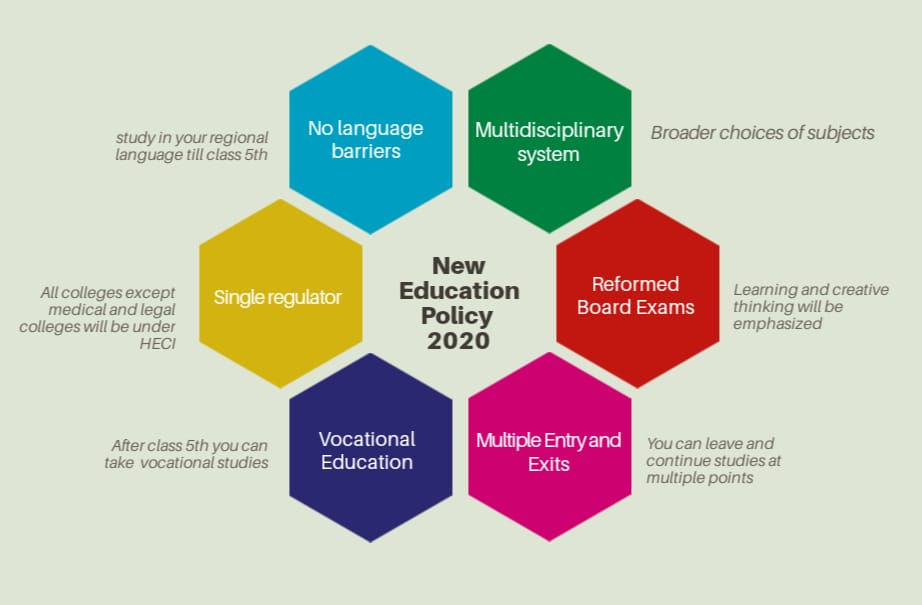A New Chapter in Indian Education System: NEP 2020
- Nidhi Gahlawat
- Aug 29, 2020
- 5 min read
To bring a significant improvement in a country one needs to work upon its education system.
And after more than three decades, the nation is witnessing a much-needed change in the education system of our country. The Indian government replaced a 34-year-old National Policy on Education, framed in 1986, with the New Education Policy of 2020.
Since the announcement, we all are hearing a lot about this change. But, everyone seems unclear about the changes and their impacts on the lives of the students. The students are concerned about the new rules that will come into place, and the parents are worried about how it will affect the future of their child. Today we will talk in-depth about the changes and will also tell you about how it would help in better growth of students and the nation as a whole.
What are the major changes?

- For schools
1.) 5+3+3+4 system: Till now, our education system followed a 10+12 method, but according to NEP 2020, we will have a 5+3+3+4 system:
Foundational stage: This stage will include the three years of pre-primary and first and second classes, covering the age group of 3 to 8 years. This stage will be the building blocks to a strong foundation of a child. Here the focus would be on the establishment of values and creativity in children using games and other activity-based methods.
Preparatory stage: This stage under the National Education Policy will cover school education from class 3-5 with a focus on experimental learning. It will comprise the age group of 8-11 years. The focus would shift to play, discovery and activity-based and interaction classroom learning.
Middle stage: The Middle Stage will comprise three years of education covering classes 6-8 and the age group of 11-14 years. Here, the students will get introduced to more abstract concepts in each subject that students will be ready for at this stage across the sciences, mathematics, arts, social sciences, and humanities. Experiential learning within each subject will get emphasized despite the introduction of more specialized subjects.
Secondary stage: The Secondary Stage will comprise of four years of multidisciplinary study, covering the age group of 14 to 18 years. This stage will build on the curricular style of the Middle Stage, but with greater depth, higher critical thinking, greater attention to life aspirations, and greater flexibility and the subjects that a student chooses.

2.) No language barriers:
The NEP says students until Class 5 should be taught in their mother tongue or regional language. This step will ensure that students indulge in the activities in school without facing any language issue. Thus, reducing the drop-out rate of students in local areas and triabal areas.
3.) Vocational Education and Skills: Students can take a vocational course, during Grades 6-8, that gives a survey and hands-on experience of a sampling of essential vocational crafts, such as carpentry, electric work, metalwork, gardening, pottery making, etc., as decided by States and local communities and as mapped by local skilling needs.
4.) Redesigned Report Cards: The progress card of all students for school-based assessment will get entirely redesigned. The progress card will be a holistic, 360-degree, multidimensional report. Report cars will include self-assessment, peer assessment, and growth of the child in various activities given by the school, along with teacher assessment.
5.) Reformation of Board exams: The board exams for class 10th and 12th will continue in the new system too, but the system will reform to promote actual learning rather than cramming. Board exams will test primarily focus on the capacity of students rather than months of coaching and memorization.
6.) No boundaries between Science, Arts and Commerce: Under NEP 2020, there will be no definite divisions between arts and sciences, between curricular and extra-curricular activities, between vocational and academic streams. Students can choose subjects of their liking across the streams.
- For Colleges
Multiple exit and Multiple entry: The undergraduate degree will be of a duration of either three or four years, with multiple exit points.
For instance: A certificate after completing one year in a discipline or field including vocational and professional areas. A diploma after two years of study. A Bachelor’s degree after a 3-year programme. The 4-year multidisciplinary Bachelor’s programme, however, shall be the preferred option.
Credit Bank: An Academic Bank of Credit (ABC) shall be established which would digitally store the academic credits earned during the academic period of a student. This way would ensure that a student won't lose the credit of his/her studies if he/she leaves the college after some time due to any reason.
Single Regulator: All colleges except medical and legal colleges will be regulated by a single body which will be called the Higher Education Commission of India (HECI). Thus, eliminating the duplication and disjunction of regulatory efforts by the multiple regulatory agencies like UGC, AICTE, COA etc. that exist at the current time.

Only University: The present complex naming of higher education institutions such as: deemed to be university, affiliating university, affiliating technical university etc. shall be replaced simply by 'university'. A university will mean a multidisciplinary institution that offers undergraduate and graduate programmes, with high-quality teaching, research, and community engagement.
Mentoring: A National Mission for Mentoring shall be established, with a large pool of outstanding senior/retired faculty – including those with the ability to teach in Indian languages – who would be willing to provide short and long-term mentoring/professional support to university/college teachers.
Lok Vidya: Lok Vidya, i.e., necessary vocational knowledge developed in India, will also be made accessible to students.
How will NEP 2020 revolutionize the growth coming generations?
Till now we came to know the significant changes NEP will bring but, how will this impact the coming generations?
Well, this policy is something that the country needed so that we can focus more on the learning process rather than memorization. Till now, the students used to study before the exams only to pass, but now they will focus on learning and exploring the knowledge rather than cramming stuff from books. This will inculcate a curious and learning attitude in them, which will prove beneficial to them in a longer run.
Vocational courses from class 6th will develop skills in the students so that they get exposed to real-life matters as well as they can explore their interests from these. Today, skills are more important than certificates, so vocational courses will help them in learning new skills which interest them.
Multidisciplinary education is indeed needed for the education of India to lead the country into the 21st century and the fourth industrial revolution. Even engineering institutions will move towards more holistic and multidisciplinary education with more arts and humanities. Students of arts and humanities will aim to learn more science and all will make an effort to incorporate more vocational subjects and soft skills.
Imaginative and flexible curricular structures will enable creative combinations of disciplines for study and would offer multiple entry and exit points, thus, removing currently prevalent rigid boundaries and creating new possibilities for life-long learning. This would help the students to take their interests further without worrying about credit and other things. Thus, letting students learn without any rigid constraint.
Thus, the New Education Policy focuses on skill-development, comprehensive growth and over-all learning, thus preparing a student for a better tomorrow. Let's embark a journey in which learning matters the most.










Comments